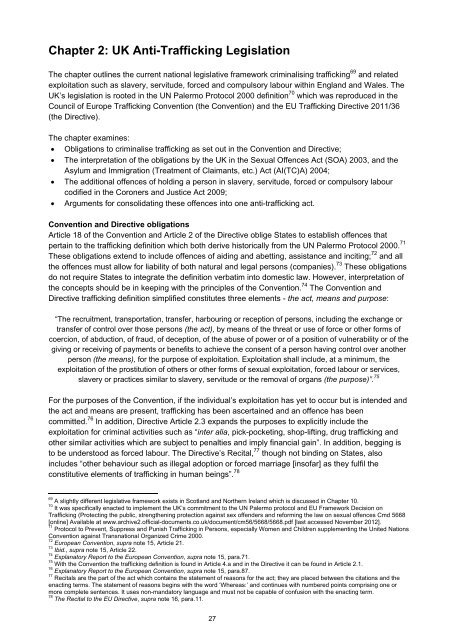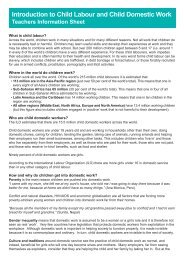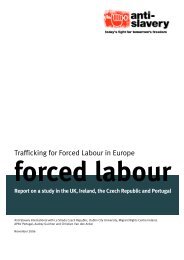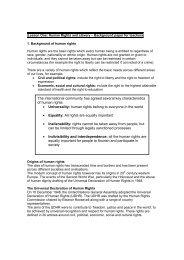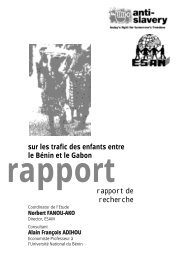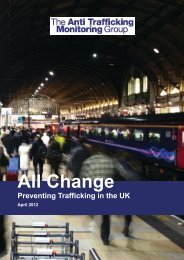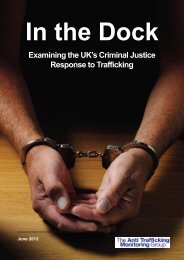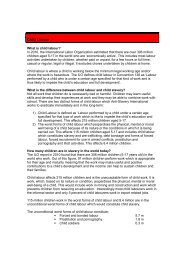NGOs and health experts also suggest that persons trafficked for labour can also experiencesymptoms indicative of PTSD. 66It is also important to note that practitioners, including <strong>the</strong> police, may develop vicarious or secondarytraumatisation which can result from engaging with traumatised victims and hearing <strong>the</strong>ir traumaticexperiences. This can result in detachment, disbelieving accounts and avoiding exploration ofinformation. 67 Therefore it is equally important that practitioners are provided with regular checks.Exposure to prolonged and repeated traumatic episodes may deeply impact upon <strong>the</strong> traffickedperson’s emotions, consciousness, self-perception, ability to make decisions and sexual behaviour.This was coined Complex Post-Traumatic Stress Syndrome (CPTSD), which can occur when aperson is held in captivity and is under <strong>the</strong> control of <strong>the</strong>ir exploiter. <strong>In</strong> this context captivity is given awide interpretation where <strong>the</strong> barriers preventing escape can be psychological ra<strong>the</strong>r than physical. 68CPTSD can change <strong>the</strong> victims’ perception of <strong>the</strong> perpetrator. This may result in <strong>the</strong> trafficked personemotionally identifying with <strong>the</strong>ir captor and forming a bond of attachment to <strong>the</strong>m.The conditions of Stockholm Syndrome and Traumatic Bonding may also explain why some traffickedpersons do not accept assistance, appear as if <strong>the</strong>y are not dissatisfied with <strong>the</strong> exploitative situation,or even return to <strong>the</strong>ir trafficker after <strong>the</strong>ir release. Traumatic Bonding <strong>the</strong>ory is mostly used todescribe why people who suffer domestic violence remain with <strong>the</strong>ir abusive partners. Some empiricalresearch confirms however that Traumatic Bonding may be equally applicable to trafficking as <strong>the</strong>reare many parallels with domestic abuse in terms of control mechanisms employed by <strong>the</strong> exploiter.ConclusionFor <strong>the</strong> first time in 2012, <strong>the</strong> Government published data revealing that trafficking for all forms offorced labour exceeds <strong>the</strong> number for trafficking for sexual exploitation in <strong>the</strong> UK, and an increase in<strong>the</strong> number of identified trafficked men. Moreover, in 2012, <strong>the</strong> highest number of potential traffickedpersons has been referred to <strong>the</strong> NRM since it began recording trafficking data in 2009.Traffickers are constantly exploring new areas and industries where <strong>the</strong>y can generate profit from <strong>the</strong>exploitation of o<strong>the</strong>rs. Hence, understanding how <strong>the</strong> trafficking “enterprise” works and <strong>the</strong> impact of<strong>the</strong> crime on its victims is essential. Trafficked persons are subject to sophisticated methods of controlused by <strong>the</strong>ir traffickers to subjugate <strong>the</strong>m into complying with <strong>the</strong>ir demands. The mechanisms ofcontrol applied by <strong>the</strong> traffickers on <strong>the</strong>ir victims often leave long-lasting psychological and physicalimpacts. These make it more difficult for law enforcement and o<strong>the</strong>r CJS actors to identify and assist.The report will discuss throughout <strong>the</strong> importance of developing a CJS response that takes intoaccount <strong>the</strong> changes in traffickers’ methods, <strong>the</strong> complexities of <strong>the</strong> crime and its impact on <strong>the</strong>victims’ ability to participate in criminal proceedings.66Oram (1) supra note 58.67Lerias, D. & Byrne, M., ‘Vicarious traumatization: symptoms and predictors’ Stress and Health Vol. 19:3 (2003), pp.129–138; andElwood, et al., ‘Secondary trauma symptoms in clinicians: A critical review of <strong>the</strong> construct, specificity, and implications for traumafocusedtreatment’ Clinical Psychology Review Vol. 31 (2011), pp.25–36.68Herman, supra note 40.26
Chapter 2: UK Anti-Trafficking LegislationThe chapter outlines <strong>the</strong> current national legislative framework criminalising trafficking 69 and relatedexploitation such as slavery, servitude, forced and compulsory labour within England and Wales. TheUK’s legislation is rooted in <strong>the</strong> UN Palermo Protocol 2000 definition 70 which was reproduced in <strong>the</strong>Council of Europe Trafficking Convention (<strong>the</strong> Convention) and <strong>the</strong> EU Trafficking Directive 2011/36(<strong>the</strong> Directive).The chapter examines:• Obligations to criminalise trafficking as set out in <strong>the</strong> Convention and Directive;• The interpretation of <strong>the</strong> obligations by <strong>the</strong> UK in <strong>the</strong> Sexual Offences Act (SOA) 2003, and <strong>the</strong>Asylum and Immigration (Treatment of Claimants, etc.) Act (AI(TC)A) 2004;• The additional offences of holding a person in slavery, servitude, forced or compulsory labourcodified in <strong>the</strong> Coroners and Justice Act 2009;• Arguments for consolidating <strong>the</strong>se offences into one anti-trafficking act.Convention and Directive obligationsArticle 18 of <strong>the</strong> Convention and Article 2 of <strong>the</strong> Directive oblige States to establish offences thatpertain to <strong>the</strong> trafficking definition which both derive historically from <strong>the</strong> UN Palermo Protocol 2000. 71These obligations extend to include offences of aiding and abetting, assistance and inciting; 72 and all<strong>the</strong> offences must allow for liability of both natural and legal persons (companies). 73 These obligationsdo not require States to integrate <strong>the</strong> definition verbatim into domestic law. However, interpretation of<strong>the</strong> concepts should be in keeping with <strong>the</strong> principles of <strong>the</strong> Convention. 74 The Convention andDirective trafficking definition simplified constitutes three elements - <strong>the</strong> act, means and purpose:“The recruitment, transportation, transfer, harbouring or reception of persons, including <strong>the</strong> exchange ortransfer of control over those persons (<strong>the</strong> act), by means of <strong>the</strong> threat or use of force or o<strong>the</strong>r forms ofcoercion, of abduction, of fraud, of deception, of <strong>the</strong> abuse of power or of a position of vulnerability or of <strong>the</strong>giving or receiving of payments or benefits to achieve <strong>the</strong> consent of a person having control over ano<strong>the</strong>rperson (<strong>the</strong> means), for <strong>the</strong> purpose of exploitation. Exploitation shall include, at a minimum, <strong>the</strong>exploitation of <strong>the</strong> prostitution of o<strong>the</strong>rs or o<strong>the</strong>r forms of sexual exploitation, forced labour or services,slavery or practices similar to slavery, servitude or <strong>the</strong> removal of organs (<strong>the</strong> purpose)”. 75For <strong>the</strong> purposes of <strong>the</strong> Convention, if <strong>the</strong> individual’s exploitation has yet to occur but is intended and<strong>the</strong> act and means are present, trafficking has been ascertained and an offence has beencommitted. 76 <strong>In</strong> addition, Directive Article 2.3 expands <strong>the</strong> purposes to explicitly include <strong>the</strong>exploitation for criminal activities such as “inter alia, pick-pocketing, shop-lifting, drug trafficking ando<strong>the</strong>r similar activities which are subject to penalties and imply financial gain”. <strong>In</strong> addition, begging isto be understood as forced labour. The Directive’s Recital, 77 though not binding on States, alsoincludes “o<strong>the</strong>r behaviour such as illegal adoption or forced marriage [insofar] as <strong>the</strong>y fulfil <strong>the</strong>constitutive elements of trafficking in human beings”. 7869A slightly different legislative framework exists in Scotland and Nor<strong>the</strong>rn Ireland which is discussed in Chapter 10.70It was specifically enacted to implement <strong>the</strong> UK’s commitment to <strong>the</strong> UN Palermo protocol and EU Framework Decision onTrafficking (Protecting <strong>the</strong> public, streng<strong>the</strong>ning protection against sex offenders and reforming <strong>the</strong> law on sexual offences Cmd 5668[online] Available at www.archive2.official-documents.co.uk/document/cm56/5668/5668.pdf [last accessed November 2012].71Protocol to Prevent, Suppress and Punish Trafficking in Persons, especially Women and Children supplementing <strong>the</strong> United NationsConvention against Transnational Organized Crime 2000.72European Convention, supra note 15, Article 21.73Ibid., supra note 15, Article 22.74Explanatory Report to <strong>the</strong> European Convention, supra note 15, para.71.75With <strong>the</strong> Convention <strong>the</strong> trafficking definition is found in Article 4.a and in <strong>the</strong> Directive it can be found in Article 2.1.76Explanatory Report to <strong>the</strong> European Convention, supra note 15, para.87.77Recitals are <strong>the</strong> part of <strong>the</strong> act which contains <strong>the</strong> statement of reasons for <strong>the</strong> act; <strong>the</strong>y are placed between <strong>the</strong> citations and <strong>the</strong>enacting terms. The statement of reasons begins with <strong>the</strong> word ‘Whereas:’ and continues with numbered points comprising one ormore complete sentences. It uses non-mandatory language and must not be capable of confusion with <strong>the</strong> enacting term.78The Recital to <strong>the</strong> EU Directive, supra note 16, para.11.27
- Page 1 and 2: In the DockExamining the UK’s Cri
- Page 3 and 4: AcknowledgementsThis report was mad
- Page 5 and 6: PrefaceIn May 2009, a group of nine
- Page 7 and 8: Misconceptions around exploitation
- Page 9 and 10: Acronyms and abbreviations frequent
- Page 11 and 12: Executive SummaryIn the Dock is The
- Page 13 and 14: Furthermore, the current legislatio
- Page 15 and 16: The ATMG was made aware of some cas
- Page 17 and 18: • Introduce mandatory child-speci
- Page 19 and 20: • The UK’s ability to meet the
- Page 21 and 22: Traffickers’ primary motivation i
- Page 23 and 24: • Money launderers - turn profits
- Page 25 and 26: out to perpetuate the exploitative
- Page 27: [their] own enslavement” is as fu
- Page 31 and 32: nationals who commit trafficking of
- Page 33 and 34: Like the SOA, the “act” element
- Page 35 and 36: (b) D requires another person to pe
- Page 37 and 38: Forced or compulsory labourThe defi
- Page 39 and 40: ConclusionAs a consequence of the s
- Page 41 and 42: concerningly, the number of convict
- Page 43 and 44: women who were recruited in Poland
- Page 45 and 46: Chapter 4: Identifying trafficking
- Page 47 and 48: Misconceptions around exploitationT
- Page 49 and 50: espond inadequately to a trafficked
- Page 51 and 52: multi-agency teams was described by
- Page 53 and 54: Josie Connors. 179 In summary, inte
- Page 55 and 56: defending a trafficked person for f
- Page 57 and 58: “[B]ecause the NRM decision is on
- Page 59 and 60: PTSD. 196 A Consultant Psychiatrist
- Page 61 and 62: etween the client and the police, i
- Page 63 and 64: Regular communication needs to be s
- Page 65 and 66: Priority planningA particular issue
- Page 67 and 68: Chapter 6: Multi-agency and interna
- Page 69 and 70: canvassing for tarmacking opportuni
- Page 71 and 72: Despite this, it would appear that
- Page 73 and 74: Good practice - Operation Golf 229O
- Page 75 and 76: Chapter 7: Criminal proceedingsThe
- Page 77 and 78: Law enforcement working on the case
- Page 79 and 80:
trafficking require particular unde
- Page 81 and 82:
JuryPractitioners suggested that th
- Page 83 and 84:
years”. 258 Ambiguity within the
- Page 85 and 86:
officer stated that not all judges
- Page 87 and 88:
jurors to be assisted with expert e
- Page 89 and 90:
Good feedback was received from sem
- Page 91 and 92:
The Convention does recognise that
- Page 93 and 94:
Another option for trafficked victi
- Page 95 and 96:
There are two models with respect t
- Page 97 and 98:
1. Is there clear evidence that the
- Page 99 and 100:
decision can be taken into account
- Page 101 and 102:
also entails being “alert to the
- Page 103 and 104:
In some cases concerns were even ra
- Page 105 and 106:
Chapter 9: Prosecuting child traffi
- Page 107 and 108:
However, many children are not refe
- Page 109 and 110:
trafficking”. 352 It states: “W
- Page 111 and 112:
Previous research has found that th
- Page 113 and 114:
children as well as assisting in pr
- Page 115 and 116:
Child trafficking trainingThere is
- Page 117 and 118:
were too traumatic to involve them
- Page 119 and 120:
committed by a child whilst in a co
- Page 121 and 122:
• Introduce mandatory child-speci
- Page 123 and 124:
IdentificationThe PSNI is the main
- Page 125 and 126:
participants suggest that this is b
- Page 127 and 128:
The PPS stated that the reasons for
- Page 129 and 130:
this research was aware of potentia
- Page 131 and 132:
convictions of traffickers prosecut
- Page 133 and 134:
Possibly in response to certain hur
- Page 135 and 136:
espectively. In addition to custodi
- Page 137 and 138:
Conclusion and RecommendationsThe A
- Page 139 and 140:
CRIMINAL PROCEEDINGS• Ensure that
- Page 141 and 142:
Crown Prosecution Service, Legal Gu
- Page 143 and 144:
Herman. J. Trauma and Recovery: The
- Page 145 and 146:
Annex I: Trafficking and other form
- Page 147 and 148:
(a) on summary conviction, to impri
- Page 149 and 150:
(b) which country is the country of
- Page 151 and 152:
2009 Istvan Kalocsai (Snr)MetS.57 o
- Page 153 and 154:
2009 causing actual bodily harm, su
- Page 155 and 156:
Skirmantas Kvedaras Feed, 2010 Rape
- Page 157 and 158:
2012 Ahdel Ali (24)Mubarek Ali (29)
- Page 159 and 160:
Annex III: The CPS’s Seven Stages
- Page 161 and 162:
159


